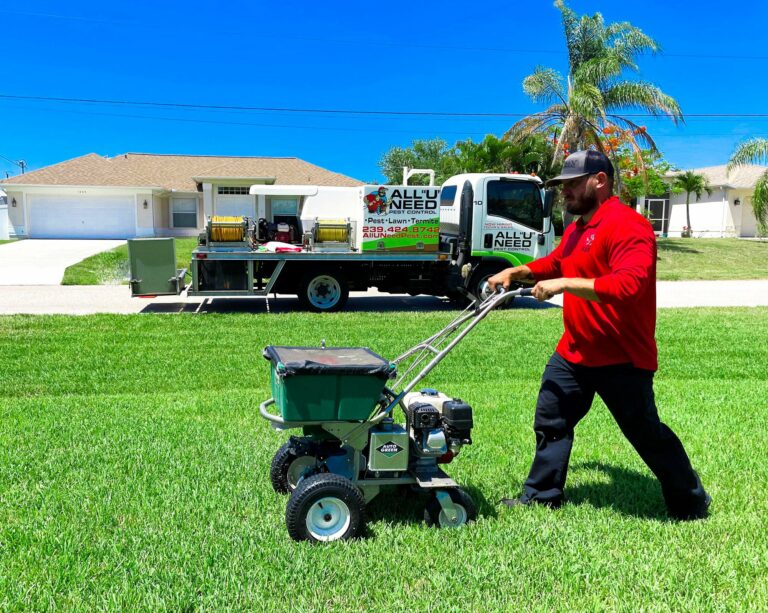Your Guide to Brown Spots in Lawn in Cape Coral
Published: January 4, 2024

If you've noticed unsightly brown spots on your lawn or would you like your grass greener in Cape Coral, don't panic just yet. While it's natural to be concerned about the health of your Florida grass, there are several possible causes for these brown patches. In this guide, All U Need Pest will explore some common culprits behind brown grass and provide tips on how to build a healthy lawn.

Understanding the Causes
1. Lack of Water
One of the most common reasons for brown spots in lawns is a lack of water. If your grass isn't receiving enough hydration, it can become stressed and develop dry patches. This is especially true during hot and dry weather conditions.
Tip: Ensure that your lawn receives adequate watering, especially during periods of drought or high temperatures. Consider using a sprinkler system or watering early in the morning when evaporation rates are lower.
2. Overwatering
On the flip side, overwatering is a common issue can also lead to brown spots on your lawn. Excessive moisture can create an ideal breeding ground for fungus growth and other diseases that damage grass.
Tip: Water your lawn deeply but infrequently to encourage deep root growth and prevent over-saturation of the soil.
3. Fungal diseases
Fungal infections, such as dollar spot or brown patch disease, can cause circular or irregular-shaped brown patches on your lawn. These diseases thrive in warm and humid conditions. Some different types of fungus are large patch fungus, fairy ring, root rot. After a fungus is treated you will need to install plugs as a lawn patching repair to the dead spots. Look for discoloration in your lawn
Tip: To prevent lawn fungus, avoid overwatering and ensure proper air circulation by trimming trees and shrubs near your lawn.
4. Pest Infestation
Common lawn pests, like grubs or chinch bugs, can wreak havoc on your grass by feeding on its roots or blades. This feeding activity can result in brown spots affecting the appearance or even complete turf loss if left untreated.
Tip: Regularly inspect your lawn for signs of insect activity, such as thinning grass or visible pests. Consult with a professional pest control service to identify the exact pest and treat any infestations.
5. Soil Compaction
Compacted soil can prevent water and nutrients from reaching the roots of your grass, leading to brown spots and overall poor lawn health. Common causes of soil compaction include heavy foot traffic and excessive thatch buildup.
Tip: Aerate your lawn regularly to alleviate soil compaction and promote better water absorption and root growth.
6. Mowing Improperly
Mowing improperly can damage your grass by causing "scalping," cutting the grass too short, which weakens the root system and exposes the soil to potential erosion and weed growth. Additionally, irregular or infrequent mowing leads to uneven growth, inhibiting healthy development and inviting pests and diseases to thrive in your lawn. If the grass is mowed will dull blades, it will tear at the grass blades instead of cutting them, leading to a weakened grass and browning. Sharpening your blades will lead to healthier lawn grass and is essential for proper lawn care.
Taking Action
Now that you have a better understanding of the potential causes behind brown spots in your lawn, it's time to take action. Here are some steps you can follow to restore the health and beauty of your turf:
- Identify the specific cause by closely examining the affected areas.
- Adjust your watering practices based on whether you're overwatering or underwatering.
- Treat any fungal infections with appropriate fungicides.
- Address insect infestations by using targeted pest control methods.
- Improve soil condition through aeration, dethatching, or topdressing with compost.
Remember, if you're unsure about the cause or how to remedy brown spots in your lawn, it's always best to consult with a professional lawn care service like All U Need Pest Control in Cape Coral. They have the expertise and knowledge to diagnose and treat lawn issues effectively.
By following these guidelines and seeking professional help when needed, you’ll know what to do if you get brown spots in your lawn in Cape Coral.
So don't let those brown spots get you down – take action today for a healthier, more vibrant lawn!